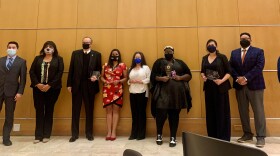-
Society's reliance on technology is not only a barrier, but an equity issue.
-
Society's reliance on technology is not only a barrier but an equity issue.
-
The landmark legislation designed to ensure equal opportunity for women has become almost synonymous with women's collegiate sports.
-
In this episode, an exerpt from IPR's podcast From the Archives reflects on the career of Iowa legislator Minnette Doderer, who fought for equal treatment for men and women.
-
Hundreds of students marched and rallied at Coe College in Cedar Rapids Thursday to protest what they see as a lack of action on diversity, equity and inclusion efforts. The students were galvanized by the resignation of a longtime trustee who had criticized the school's recent presidential search process as lacking diversity.
-
Ottumwa Pride leaders say they won't be deterred by anti-LGBTQ comments from city council candidatesOrganizers with Ottumwa Pride say they won’t be deterred by anti-LGBTQ statements made by candidates running for the city council. During a public forum last week, two candidates voiced opposition for city support of LGBTQ Pride activities, with one asking if ‘pedophiles’ also deserved ‘special’ treatment.
-
The University of Iowa has reached a settlement agreement for a Title IX lawsuit brought by female athletes who alleged the school isn’t providing equal access in sports. As part of the agreement, the UI Athletics Department is creating a women's wrestling program, a decision the athletic director called "historic."
-
A federally-funded clinic in rural Mississippi embodies the history of community health centers in the U.S., and shows how these safety-net clinics can help minority patients during the pandemic.
-
Central College is doing away with its requirement that students submit ACT or SAT scores in order to apply. It's part of a nationwide trend towards being "test optional," a shift that has accelerated during the coronavirus pandemic.
-
A Latino advocacy group has organized a bilingual question-and-answer session about COVID-19 vaccines. It’s because they’re worried some people may be falling behind on current information, especially if English isn’t their first language.
Play Live Radio
Next Up:
0:00
0:00
Available On Air Stations






